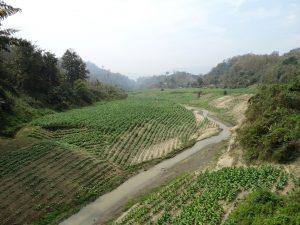Researchers working on malaria research at icddr,b have recently worked on a number of important studies in malaria-endemic regions including on enzyme-deficiency which affects over 400 million people worldwide.

Photo: Andy Langager. CC BY-NC 2.0
The recent studies, published in BMC Research Notes and in PLoS One, shed light on further insights into Glucose-6-phosphate dehydrogenase deficiency (G6PD deficiency). It is an enzyme deficiency which may be the cause of aggravation of condition in malaria patients when they are being treated with anti-malaria medication.
“In order to carry out these studies, icddr,b Emerging Infections & Parasitology Laboratory has gained the status of a reference laboratory for G6PD testing by WHO Essential Medicines and Health Products,” says Dr Mohammad Shafiul Alam, icddr,b associate scientist and one of researchers working on malaria at icddr,b.
The lab recently completed the first ever WHO prequalification testing for G6PD point of care test (POC). The lab is also working as a regional reference centre for G6PD testing by the Vivax Working Group of the Asia Pacific Malaria Elimination Network and recently trained researchers from Nepal on G6PD testing through an APMEN project.
Dr Wasif Ali Khan, icddr,b scientist and author of most malaria-related publications, is closely working with the APMEN Vivax Working Group for quantifying primaquine (malaria drug) effectiveness and improving adherence.

Malaria-endemic Chittagong Hill Tracts. Photo: Adam Jones / CC BY-SA 2.0
icddr,b has collaborated with the Armed Forces Research Institute of Medical Sciences (AFRIMS), Thailand in order to participate in interlaboratory validation of in vitro antimalarial drug sensitivity assays.
“In the next phase, a collaborative surveillance for anti-malarial drug resistance status has been planned,” informs Dr Khan.
The researchers have also collaborated with research on the effect of chloroquine dose and primaquine on Plasmodium vivax recurrence and Risk of Plasmodium vivax parasitaemia after Plasmodium falciparum infection – results of which were published [1] [2] in The Lancet Infectious Diseases.
In collaboration with the University of Notre Dame, USA, the Emerging Infections & Parasitology Laboratory of icddr,b has been successful in cultivation of Bangladeshi field isolates collected from malaria patients from Bandarban.
“This is the first-ever work on some Bangladeshi field isolates of Plasmodium facliparum that have been adapted to the laboratory condition. These isolates will open new insights if Bangladeshi strains are different from others while the whole genome sequencing of these isolates are underway,” comment Dr Alam.

